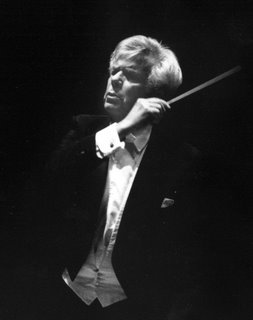Dohnanyi's Brahms Wins the Day
 At 76 years old, Christoph von Dohnányi is one of the elder statesmen of conducting, well known in this country from his 18-year tenure with the Cleveland Orchestra (1984-2002). On Thursday he graced Washington with a hearty central-European program of Bartók, Schumann, and Brahms. A relaxed and fluid account of the Bartók Divertimento for String Orchestra opened the evening. Apart from a brief sour moment among the violins, the National Symphony Orchestra responded well to Dohnányi’s precise and gentle leadership. Concertmaster Nurith Bar-Josef had nice opportunities to shine in the solo passages. The Molto Adagio flowed expansively, the Allegro assai had – naturally – more bite and reminded of the Haydn sonatas heard on Tuesday; less enchanting though the whole thing may have been.
At 76 years old, Christoph von Dohnányi is one of the elder statesmen of conducting, well known in this country from his 18-year tenure with the Cleveland Orchestra (1984-2002). On Thursday he graced Washington with a hearty central-European program of Bartók, Schumann, and Brahms. A relaxed and fluid account of the Bartók Divertimento for String Orchestra opened the evening. Apart from a brief sour moment among the violins, the National Symphony Orchestra responded well to Dohnányi’s precise and gentle leadership. Concertmaster Nurith Bar-Josef had nice opportunities to shine in the solo passages. The Molto Adagio flowed expansively, the Allegro assai had – naturally – more bite and reminded of the Haydn sonatas heard on Tuesday; less enchanting though the whole thing may have been.
Dohnányi / D'Albert/ Enescu, Works for Cello and Orchestra, Gerhardt / BBCScO / Kalmar |
 Broad and muscular the timpani-driven opening of Brahms’s first symphony… before a gentler tone enters – only for the swell to return like the tide. Brahms is one of the surprisingly few composers to have composed Romantic symphonies in the classic(al) symphonic form. Apart from Schumann, Schubert, Beethoven (who already left that form behind in the 9th), we might include Tchaikovsky and Dvořák among the first-rate composers who operated in that field. That our idea of a symphony is so closely linked to their model says something about the quality of their output. And Brahms’s work is of the highest quality, indeed. It may seem silly to us to look back on the great Brahms’s worries about writing a symphony in a post-Beethoven musical world, but whether his doubts and patience were justified or necessary, the result certainly was worth waiting for. Few composers (any?) have written such a masterwork as their first symphony. Indeed, it is impossible for casual ears to detect any difference in maturity and mastery among the four that constitute Brahms’s entire output in that genre.
Broad and muscular the timpani-driven opening of Brahms’s first symphony… before a gentler tone enters – only for the swell to return like the tide. Brahms is one of the surprisingly few composers to have composed Romantic symphonies in the classic(al) symphonic form. Apart from Schumann, Schubert, Beethoven (who already left that form behind in the 9th), we might include Tchaikovsky and Dvořák among the first-rate composers who operated in that field. That our idea of a symphony is so closely linked to their model says something about the quality of their output. And Brahms’s work is of the highest quality, indeed. It may seem silly to us to look back on the great Brahms’s worries about writing a symphony in a post-Beethoven musical world, but whether his doubts and patience were justified or necessary, the result certainly was worth waiting for. Few composers (any?) have written such a masterwork as their first symphony. Indeed, it is impossible for casual ears to detect any difference in maturity and mastery among the four that constitute Brahms’s entire output in that genre.Particularly nice, then, to hear a splendid performance of it under Dohnányi. Levelheaded and involving, I wouldn’t expect any other orchestra to turn in a better one on any given Thursday. If I can say “plain good” without insinuating damnation by faint praise, I’ll do that. The orchestra noticeably followed every one of Dohnanyi’s instructions and gestures incisively. The brass delivered time and again. It was a good thing to have heard – and can be heard again this afternoon at 1:30PM and on Saturday at 8PM. Tim Page's review - more enthusiastic, still - can be read at the Washington Post's Web site: "Dohnanyi's NSO Debut Is One for the Ages."





















































2 comments:
I think you left out Mendelssohn, unless there's something about his symphonies (aside from the "Lobgesang" or the maybe the "Reformation") that don't fit in with the classical style. Perhaps you don't consider him "first rate"... but I think that would be a bit unfair.
I suppose Mendelssohn - with his 60% hit-rate (as far as form, not quality is concerned) - belongs. My favorite is the 2nd, though --"Stehet auf von den Toten"-- and perhaps that's why I was not thinking of it at the time.
Post a Comment